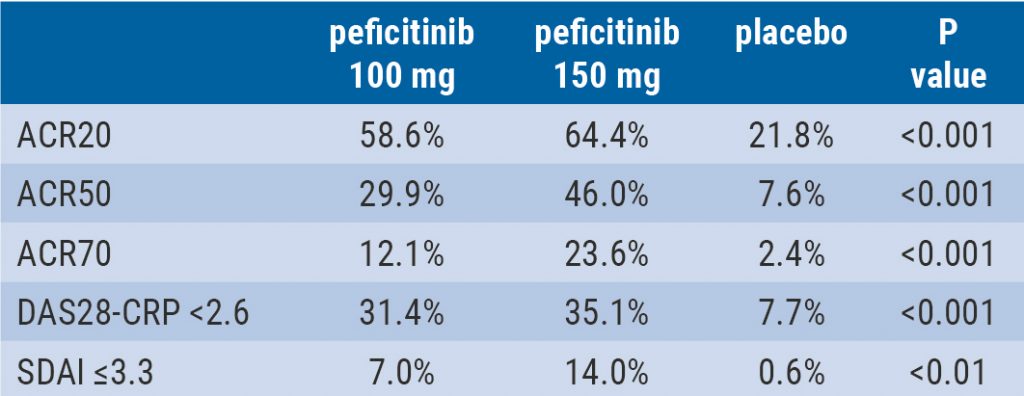Filgotinib, the orally administered, selective inhibitor of JAK1 has shown good efficacy and was well tolerated for the treatment of rheumatoid arthritis (RA) in phase 2 and 3 studies evaluating patients with prior inadequate response to biologics or as add-on to methotrexate [2,3].
The phase 3 FINCH 3 trial, conducted by Prof. Rene Westhovens (University of Leuven, Belgium) and his colleagues, now investigated efficacy and safety of filgotinib as monotherapy or in combination with methotrexate in methotrexate-naïve RA patients. At screening, patients had an ACR functional class 1-3, swollen joint count in 66 joints (SJC66) ≥6, and 68‐joint tender joint count (TJC68) ≥6. A total of 1,249 randomised patients received one of the study drug regimens: group A, filgotinib 200 mg plus methotrexate; group B, filgotinib 100 mg plus methotrexate; group C, monotherapy with filgotinib 200 mg; and group D, monotherapy with methotrexate. Primary outcome was the proportion of patients reaching an ACR20 response at week 24. In addition, secondary outcomes such as ACR70 response, Disease Activity Score 28/C-reactive protein (DAS28-CRP) ≤3.2 and <2.6, and van der Heijde modified Total Sharp Score (mTSS) were evaluated. At baseline, most patients (76.9%) were female and 35.9% were treated with corticosteroids. At this point, RA was diagnosed 2.2 years earlier (mean value) and the mean DAS28-CRP was 5.7.
At week 24, significantly more patients in group A (81%, P<0.001) and group B (80.2%, P<0.05) achieved ACR20 response, compared with those using monotherapy with methotrexate (71.4%; see Figure). ACR20 was observed in 78.1% receiving monotherapy with filgotinib. ACR70 rates for arms A-D were 43.8%, 40.1%, 40.0%, and 26.0%. All filgotinib arms attained DAS28-CRP <3.2 in 60% of patients or more, while with methotrexate monotherapy this was reached only by 46.2% of patients. In addition, both filgotinib combination arms (groups A and B) slowed radiographic progression compared with methotrexate monotherapy (P<0.01 for both comparisons). All filgotinib arms were significantly superior to methotrexate with regard to physical function. A clinically meaningful response to filgotinib occurred as early as 2 weeks after treatment initiation. A higher proportion of patients receiving filgotinib either alone or in combination with methotrexate achieved clinical remission.
Figure: Primary outcome of the FINCH 3 trial: ACR20 response at week 24 [1]
Filgotinib alone or in combination with methotrexate was well tolerated. Any kind of treatment-emergent adverse event was seen in 65.9% (group A), 69.6% (group B), 53.8% (group C), and 62.7% (group D) of patients. Among them, serious adverse events occurred in 4.1% (group A), 2.4% (group B), 4.8% (group C), and 2.9% (group D); rates for serious infections were 1.0%, 1.0%, 1.4%, and 1.0% respectively.
- Westhovens R et al. Abstract 927. ACR 2019, 9-13 November, Atlanta (GA/USA).
- Genovese M, et al. JAMA 2019;322:315-325.
- Westhovens R, et al. Ann Rheum Dis 2017;76:998-1008.
Posted on
Previous Article
« Higher psychiatric comorbidity in women with PsA Next Article
Hand OA: low-dose corticosteroids improve symptoms »
« Higher psychiatric comorbidity in women with PsA Next Article
Hand OA: low-dose corticosteroids improve symptoms »
Table of Contents: ACR 2019
Featured articles
Late-Breaking Abstracts
Lowest risk of infection after therapy with an IL-12/IL-23 blocker
Calcium pyrophosphate deposition disease: an independent risk factor for cardiovascular complications
Proteome abnormalities improve prediction of RA development
RA patients in remission benefit from continued therapy with conventional DMARDs
Selective IL-23 blocker shows remarkable efficacy in patients with psoriatic arthritis
Corticosteroid therapy in GCA: higher platelets – lower relapse rate
Spotlight on Rheumatoid Arthritis
Filgotinib promising in RA patients naïve to methotrexate
Sustained efficacy of monotherapy with upadacitinib after 48 weeks
Biologics show similar activity in patients with elderly-onset RA
Tocilizumab outperforms rituximab in RA patients with low level of synovial B cell infiltration
Treatment decisions should not be guided by ultrasound findings
Cancer treatment with checkpoint inhibitors in RA patients?
What is Hot in Systemic Lupus Erythematosus
Anifrolumab succeeds in second phase 3 trial in SLE
Depression closely related to fatigue in SLE patients
Spondyloarthritis – The Beat Goes On
Psoriasis onset determines sequence of symptoms
Higher psychiatric comorbidity in women with PsA
JAK1 inhibition shows remarkable efficacy in AS
CARDAS study shows increased prevalence of cardiac valvular disorders in AS patients
Osteoarthritis – State-of-the-Art
Hand OA: low-dose corticosteroids improve symptoms
Opioids: no quality of life benefits for OA patients
Walking speed is a predictor of mortality in patients with knee OA
Reproductive Issues in Rheumatic Disease
Few serious infections in offspring with exposure to non-TNFi biologics or tofacitinib
Prevention of congenital heart block may be possible with hydroxychloroquine
TNFi for RA during pregnancy – to stop or not to stop?
Vasculitis – Novel Treatment Modalities
Rituximab maintenance superior to azathioprine in ANCA-associated vasculitis
Prolonged remission after stop of tocilizumab for patients with giant cell arteritis
Best of the Posters
Antifibrotic therapy slows disease progression independent of corticosteroid use
Fibromyalgia patients often experienced abuse in childhood
Related Articles
August 14, 2020
Anifrolumab achieves rapid and durable BICLA-response

September 4, 2019
Peficitinib likely efficacious and safe
© 2024 Medicom Medical Publishers. All rights reserved. Terms and Conditions | Privacy Policy
HEAD OFFICE
Laarderhoogtweg 25
1101 EB Amsterdam
The Netherlands
T: +31 85 4012 560
E: publishers@medicom-publishers.com

